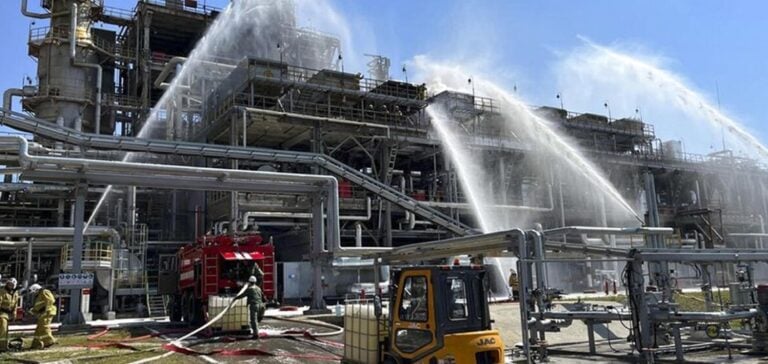Russian refineries are facing a series of Ukrainian drone attacks, threatening the stability of the energy sector. The Slavyansk refinery, hit earlier, was again targeted by six drones, according to TASS, the Russian state news agency. Eduard Trudnev, a security manager at the company, said:
“This time, the drones were bigger, the loads were also larger, and they were filled with steel balls.”
Impacts on oil infrastructures
Although the latest attack did not cause any fires, previous strikes have caused significant damage. In the past, one attack damaged a naphtha separation column, and another put a crude oil distillation unit and a vacuum distillation unit out of action. However, operations were restored in less than a month. These incidents come two days after a major attack by Ukraine on oil infrastructure in occupied Crimea and on other Russian oil infrastructure in the Black Sea. Repeated and intense attacks aimed at destabilizing Russian power.
Impact on Russian exports
The cumulative impact of the drone attacks on Russia’s gross refining capacity is now close to 1 million barrels per day, compared with around 680,000 barrels per day on May 10, according to S&P Global Commodity Insights estimates. In April, exports of Russian petroleum products fell to post-pandemic levels, while exports of oil and fuel, particularly diesel and gasoil, have continued to decline for months.
Economic and strategic implications
High stocks, in excess of 2 million tonnes, together with abundant availability on the domestic market, have helped maintain gasoline prices in Russia despite upward pressure from the planned lifting of the export ban. French-made missiles discovered in Yubileiny, in the occupied region of Luhansk, and US artillery fired on Crimea, heighten military and economic tensions.
Ukrainian drones attack Russian refineries, exacerbating Moscow’s challenges in the energy sector. Russia’s ability to rapidly restore its infrastructure and maintain exports will be crucial to its economic and geopolitical stability in the months ahead.






















